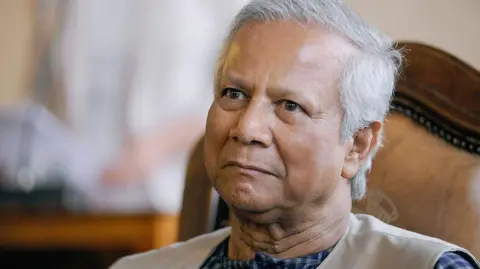 Getty Images
Getty ImagesNobel laureate Muhammad Yunus – a longtime political foe of Bangladesh’s ousted prime minister Sheikh Hasina – has been named the country’s interim leader.
The 84-year-old was appointed a day after Ms Hasina fled the country following weeks of deadly protests calling for her resignation.
While Prof Yunus has been lauded for his pioneering use of microloans, Ms Hasina regarded him as a public enemy – he is currently on bail, appealing a six-month jail term in what he has described as a politically-motivated case.
Students who led the massive protests that unseated Ms Hasina refused to accept a military-led government and pushed for Prof Yunus to lead the interim administration.
The decision to name Prof Yunus as chief adviser of the interim government followed a meeting between President Mohammed Shahabuddin, military leaders and student leaders.
“When the students who sacrificed so much are requesting me to step in at this difficult juncture, how can I refuse?” Prof Yunus had said.
He is returning to Dhaka from Paris where he is undergoing a minor medical procedure, his spokesperson said.
The protests in Bangladesh began in early July with demands from university students to abolish quotas in civil service jobs, but snowballed into a broader anti-government movement.
In all, more than 400 people are believed to have died in clashes between government forces and protesters.
On Monday alone, more than 100 people died across the country, making it the single deadliest day in the movement. Hundreds of police stations were also torched.
Hours before protesters stormed and looted the former PM’s official residence in the capital Dhaka, Ms Hasina resigned and fled to neighbouring India. That brought a swift and abrupt end to her nearly 15-year rule.
Even as Bangldesh’s economy grew in the past decade, the former PM came under increasing criticism for smothering her critics and jailing her political opponsents.
Some of them, such as ex-PM Khaleda Zia and activist Ahmad Bin Quasem, were released soon after Ms Hasina’s hasty exit.
Ms Zia chairs the main opposition, Bangladesh Nationalist Party, which boycotted elections in 2014 and again in 2024, saying free and fair polls were not possible under Ms Hasina.
The 78-year-old was imprisoned in 2018 for corruption – charges, she said, were politically motivated.
Rights groups say Mr Quasem was detained in 2016, one of hundreds of forced disappearances during Ms Hasina’s tenure.
Prof Yunus, who was sentenced to six months in jail in January for violating labour laws, has said he too was a victim of Ms Hasina’s ire.
He has faced other allegations in the past, going back to 2011 when he was accused of defaming Bangladesh’s politicians.
In 1983, he started Grameen Bank, which offers micro, long-term loans to help poor people start small businesses – a concept that has since taken off around the world.
He was accused of tax evasion and serving at Grameen Bank beyond the mandatory retirement age, which led to him being sacked – but Prof Yunus maintained that these were baseless charges.
He, along with the bank, was awarded the Nobel Peace Prize in 2006 for showing that “even the poorest of the poor can work to bring about their own development”.
He became known internationally as the “banker to the poor”, but Ms Hasina called him a “bloodsucker” of the poor and accused his bank of charging exorbitant interest rates.
It was never clear what was the origin of the feud with Ms Hasina, but many believe it was his unsuccessful efforts to set up a political party.
Ms Hasina is still in India but it’s uncelar yet if that is her final destination. Analysts believe that is unlikely despite her having been a close ally of Indian Prime Minister Narendra Modi.
India, which shares a 4,096-km (2,545-mile) border with Bangaldesh, will be averse to alienating the new government in Dhaka.
Delhi has deployed additional troops along the border, its foreign minister S Jaishankar said.
Foreign leaders called on Bangladesh to uphold democracy after Prof Yunus’s appointment was announced.
“Any decisions that the interim government makes, they need to respect democratic principles… to uphold the rule of law [and] reflect the will of the people,” US Secretary of State Antony Blinken said.
Australian foreign minister Penny Wong asked all parties to refrain from violence and “respect universal rights”.